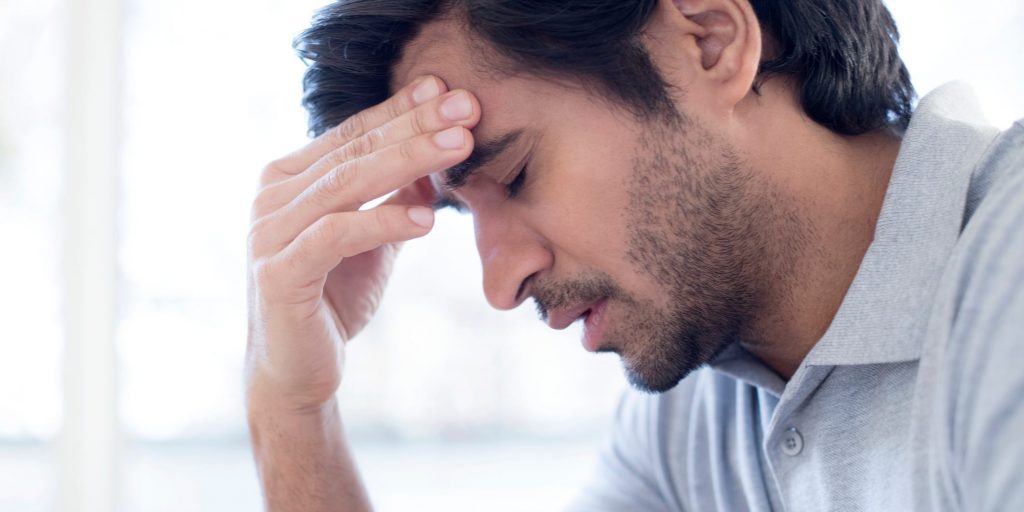
Science Photo Library/Getty Images
- Common symptoms of marijuana withdrawal include irritability, anxiety, headaches, and depression.
- Marijuana withdrawal symptoms usually peak 10 days after stopping use and resolve by day 20.
- To cope with marijuana withdrawal, seek help from a therapist, drink plenty of water, and exercise.
- Visit Insider's Health Reference library for more advice.
Marijuana has a growing list of medicinal uses and many enjoy occasionally using it for recreational purposes. However, marijuana can be addictive, resulting in uncomfortable withdrawal symptoms when some stop using the substance.
Withdrawal is more commonly associated with substances like opioids, nicotine, and alcohol, but experts say it also occurs with cannabis.
"It's usually seen in people who smoke on a regular basis, like every day, and it's becoming more prevalent and more of a problem," says Joseph DeSanto, MD, an addiction specialist at BioCorRx Recovery Program.
In fact, according to one study, nearly half of all people, about 47%, who regularly used cannabis experienced withdrawal symptoms when stopping use.
Here are common symptoms of marijuana withdrawal, how long symptoms will last, and how to seek help for an addiction to marijuana.
Marijuana withdrawal symptoms
The DSM-5 - the guide that mental health professionals use to diagnose mental health disorders - first recognized cannabis withdrawal as a diagnosis in 2015. According to its criteria, people with cannabis withdrawal experience at least three of the following symptoms within seven days of stopping:
- Irritability, anger, or aggression
- Nervousness or anxiety
- Sleep disturbance
- Decreased appetite or weight loss
- Restlessness
- Depressed mood
- Somatic symptoms, like headaches, sweating, fever, chills, shakiness/tremors nausea, or abdominal pain.
Unlike withdrawing from benzodiazepines or alcohol, marijuana withdrawal isn't life-threatening - but it can be an uncomfortable, anxiety-provoking experience.
The severity of withdrawal symptoms varies: "Most people can get through mild withdrawal periods without much effect on their daily life," DeSanto says. "But sometimes they get so out of control that you need to see a doctor."
For example, some may experience mild anxiety while others may feel they cannot socialize at all without the drug.
Marijuana withdrawal timeline
Unlike nicotine withdrawal which is well researched, the high variability of marijuana strains, doses, and preparations makes it hard to predict how the withdrawal will play out in individual users, DeSanto says. Plus, research is limited.
While symptoms and exact timing can vary, here's a timeline of what you can expect:
| Time | Symptoms |
| Hours after smoking | In daily users, symptoms appear in the first few hours. |
| Days 0 to 3 | Frequent users found irritability and anxiety were greatest on days these days. |
| Day 4 | Decreased appetite begins to normalize. |
| Day 10 | |
| Day 10 to 20 |
Symptoms steadily decline. |
"In most of my patients, typically within a week, most withdrawal physical symptoms are gone," DeSanto says
However, even after physical withdrawal symptoms like anxiety and insomnia have faded, regular users can experience psychological dependence lasting for weeks or months. These users might feel like they need marijuana for social interactions, to unwind after work, or just to get through the day.
This is more likely to be true for those who use marijuana as a crutch for other problems like depression or social anxiety, says Amol Soin, MD, the medical director of the Ohio Pain Clinic and member of the Ohio Medical Marijuana board.
How to seek help for marijuana addiction
If you experience severe withdrawal symptoms or are unable to stop using on your own, you should seek professional help.
DeSanto recommends seeing your doctor or an addiction specialist if you:
- Have no appetite and are unable to eat
- Are vomiting and unable to keep fluids down
- Are unable to sleep for more than one or two nights
- Feel severe depression, anxiety, or suicidal thoughts
- Have failed to quit numerous times
Treatment options include in-patient addiction centers and outpatient therapy. You can also join 12-step groups like Marijuana Anonymous or Narcotics Anonymous. Most people who enroll in marijuana addiction programs have been smoking daily for 10 years and have tried to quit more than six times.
Soin and DeSanto stress marijuana withdrawal symptoms are often connected to other underlying issues, like untreated anxiety and depression. Both doctors say you could benefit from seeking psychotherapy if you've been using cannabis to cope with a mental health issue and haven't yet engaged in treatment.
Insider's takeaway
Withdrawing from marijuana can be uncomfortable, but you'll feel less intimidated if you know what to expect. Common signs of marijuana withdrawal include decreased appetite, trouble sleeping, and anxiety. If you have concerns about your cannabis use and how to stop it, reach out to a doctor or addiction specialist.
